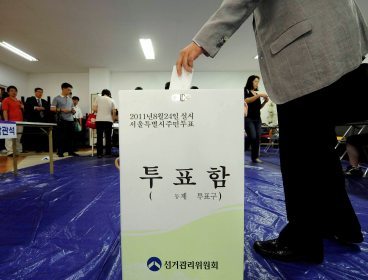Seoul Mayor Oh Se-hoon lost a politically charged referendum on whether to give free lunches to all students or only to poor students Wednesday as voter turnout was too low for the vote to be valid.
 |
A voter casts his ballot at a polling station in Seoul on Wednesday, as the capital holds its first-ever referendum on free school meals. (Kim Myung-sub/The Korea Herald) |
The turnout rate was 25.7 percent, far below the 33.3 percent required to open ballot boxes and count the votes. The referendum turnout also fell short of two previous Seoul elections, 31.4 percent for an election of a district head on April 27 this year and 53.9 percent for the mayoral election on June 2 last year. Voting lasted for 14 hours from 6 a.m. at 2,206 polling stations across the capital. There were 8,387,281 eligible voters, including 20,640 expats.
Seoul Mayor Oh Se-hoon, who had vowed to resign if he lost the vote on his proposal to offer free lunches only to poor students, regretted the referendum’s failure while acknowledging his defeat.
“It is very regrettable to lose the precious sole chance to confirm our future and the direction of desirable welfare policy. It is also sad that we can’t open the ballot boxes containing valuable opinions of the citizens,” Oh, of the ruling Grand National Party, told a news conference after the vote closed.
“I humbly accept the vote results. With gratitude, I bow to voters who cast ballots despite difficult circumstances.”
Voter turnout differed widely from district to district. The poll’s turnout was highest in the affluent southern district of Seocho at 36.2 percent, and lowest in Geumcheon at 20.2 percent.
The referendum held high political stakes for both the conservative ruling and liberal opposition camps. Oh has staked his mayoral post on the outcome of the vote, vowing Sunday to resign if he lost. It was seen as a desperate move to lift voter turnout over the 33.3 percent mark. However, as Oh lost the plebiscite, all eyes are seeking the candidate to take his place in a by-election expected in October. Oh is expected to make an announcement on when he will step down over the next few days, according to Seoul officials.
On the opposition side, the fall of the vote was a boon. The Democratic Party is expected to gain the upper hand in state welfare policies and get a boost in the race to win the hearts of voters ahead of general and presidential elections next year.
The referendum asked voters to choose between two options: one to provide free lunches to all students regardless of their parents’ income and the other to give them only to children from the bottom-50-percent income bracket. As the vote fell through, free school lunches will be provided to all children regardless of parents’ income level ― elementary school students from 2011 and all middle school students from 2012, as indicated in the plan passed by the opposition-led Seoul Council last December.
The plebiscite was requested by a union of conservative civic groups opposing a program for free lunches to all students. Oh and the council have since been at loggerheads over his favorite projects including the school lunch program.
His opponents including the main opposition Democratic Party and Seoul Council boycotted the vote to lower the turnout and to eventually invalidate the plebiscite, claiming that the selective meal service will only stigmatize recipients as children from poor families and foster disharmony among rich and poor students.
Oh has advocated the selective welfare ideology, calling liberals’ program “welfare populism” only aimed at winning votes, which will weigh on citizens financially.
By Lee Woo-young (
wylee@heraldcorp.com)








![[Today’s K-pop] Blackpink’s Jennie, Lisa invited to Coachella as solo acts](http://res.heraldm.com/phpwas/restmb_idxmake.php?idx=644&simg=/content/image/2024/11/21/20241121050099_0.jpg)